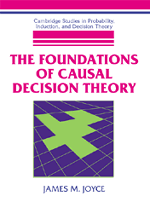Book contents
- Frontmatter
- Contents
- Preface
- Introduction: A Chance to Reconsider
- Chapter 1 Instrumental Rationality as Expected Utility Maximization
- Chapter 2 Decision Problems
- Chapter 3 Savage's Theory
- Chapter 4 Evidential Decision Theory
- Chapter 5 Causal Decision Theory
- Chapter 6 A General Theory of Conditional Beliefs
- Chapter 7 A Representation Theorem for Causal Decision Theory
- Chapter 8 Where Things Stand
- References
- Index
Chapter 3 - Savage's Theory
Published online by Cambridge University Press: 25 July 2009
- Frontmatter
- Contents
- Preface
- Introduction: A Chance to Reconsider
- Chapter 1 Instrumental Rationality as Expected Utility Maximization
- Chapter 2 Decision Problems
- Chapter 3 Savage's Theory
- Chapter 4 Evidential Decision Theory
- Chapter 5 Causal Decision Theory
- Chapter 6 A General Theory of Conditional Beliefs
- Chapter 7 A Representation Theorem for Causal Decision Theory
- Chapter 8 Where Things Stand
- References
- Index
Summary
In this chapter we investigate the version of expected utility theory developed in Savage's The Foundations of Statistics. In this immensely influential work, Savage sought to justify the principle of expected utility maximization by deriving it from plausible theses about the nature of rational preference. He did this by laying down a small system of axiomatic constraints on preference rankings, and then proving a general mathematical result, known as a representation theorem, which showed that any decision maker whose preferences satisfy the constraints automatically ranks acts by increasing expected utility. Savage took his axioms to express norms of rationality that could be justified without invoking any prior commitment to expected utility maximization. He thus saw his representation theorem as providing a rationale for such a commitment.
Savage was not the first person to prove a representation theorem of this type. The earliest such result may be found in (Ramsey 1931). Representation theorems had also appeared in (de Finetti 1964) and in (von Neumann and Morgenstern 1953) before The Foundations of Statistics was written. Savage's theorem, however, is better worked out, is more generally applicable, and has been far more influential than any of the rest. Even though the theory has some limitations, it remains the best place to start when thinking about the foundations of decision theory.
The version of Savage's theory to be outlined here will not be identical in every respect to the one in The Foundations of Statistics, but it will still be recognizably Savage's.
- Type
- Chapter
- Information
- The Foundations of Causal Decision Theory , pp. 78 - 113Publisher: Cambridge University PressPrint publication year: 1999



